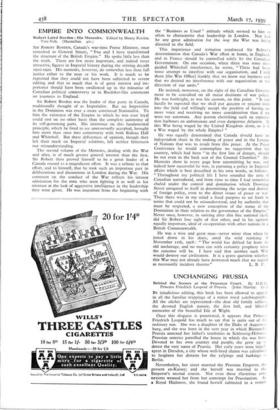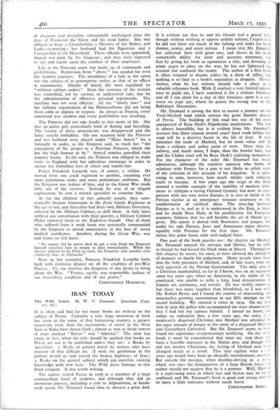UNCHANGING PRUSSIA
By injudicious editing, this book has been allowed to appear in all the familiar trappings of a minor royal autobiography. All the clichés are represented—the dear old family schloss. the devoted English nannie, the first ball, and blissful memories of the beautiful Isle of Wight. Once this disguise is penetrated, it appears that Prince,s Friedrich Leopold has much to say that is quite out of the ordinary run. She was a daughter of the Duke of Augustem burg, and she was born in the very year in which Bismarck's Prussia annexed her father's territories in Schleswig-Holstein. Prussian sentries patrolled the house in which she was born Devoted to her own country and people, she grew up t, detest the very name of Prussia. Her early years were large!' spent in Dresden, a city whose well-bred charm was calculated to heighten her distaste for the yelpings and barkings 0! Berlin.
Nevertheless, her sister married the Prussian Emperor, the present ex-Kaiser; and she herself was married to the Emperor's second cousin. Not even these illustrious con- nexions weaned her from her contempt for Prussianism. AS a Royal Highness, she found herself subjected to a system
of etiquette and discipline substantially unchanged since the days of Frederick the Great and his mad father. She was obliged to keep a Chamberlain, a Mistress of the Robes, and Ladies-in-waiting ; her husband had his Equerries and a Comptroller of the Household. These officials were appointed, though not paid, by the Emperor ; and they were expected to spy and report upon the conduct of their employers.
Life at the Prussian court was made up of commands and prohibitions. Permission from " above " was needed for even the shortest journeys. The attendance of a lady at the opera was the subject of as peremptory orders as that of an officer at manoeuvres. Details of family life were regulated by " military cabinet orders." Even the• costume of the women was controlled, not by custom or understood rule, but by the administration of offensive personal reprimands. The machine was not even efficient. All the " family laws " and the military organisation of the Hohenzollems did not bring them calm or dignity or respect. As always in Prussia, every command was strident and every prohibition was insulting.
The Princess did not take kindly to this mode of life. She was an active girl, particularly fond of skating and bicycling. The former of these amusements was disapproved and the latter strictly forbidden. On one occasion both the Princess and her husband were placed under " Haus Arrest " for a fortnight in order, as the Emperor said, to teach her " the conception of life proper to a Prussian Princess, which she has the high honour to be." Armed sentries patrolled their country house. In the end, the Princess was obliged to make visits to England with her ridiculous entourage in order to savour the forbidden joys of wheel and handle-bar.
Prince Friedrich Leopold was, of course, a soldier. He moved from one crack regiment to another, assuming ever more portentous ranks and more pretentious uniforms. But the Emperor was jealous of him, and in the Great War made little use of his services. Instead, by way of an elegant explanation, he sent a mental specialist to examine him.
As for the children of this princely couple, they auto- matically became lieutenants in the Erste Garde Regiment at the age of ten, and thereafter had their own Military Governor, selected by the Military Cabinet, to drill them. A little later, without any consultation with their parents, a Military Cabinet Order removed them to the Kadetten-Anstalt. One of them who suffered from a weak heart was personally commanded by the Emperor to attend manoeuvres in the face of seven medical certificates. Another, during the Great War, was sent home on sick leave.
No sooner did he arrive than he got a wire from the Emperor himself ordering him to return to duty immediately. When the doctors refused to let Fritz go back, the Emperor sent another wire confining him to Gleinecke " Now in her seventies, Princess Friedrich Leopold looks back with patrician disgust on all the crudities of pre-War Prussia. Yet she absolves the Emperor of any desire to bring about the War. " France, surely, was responsible, jealous of our flourishing condition and of our power."











































 Previous page
Previous page